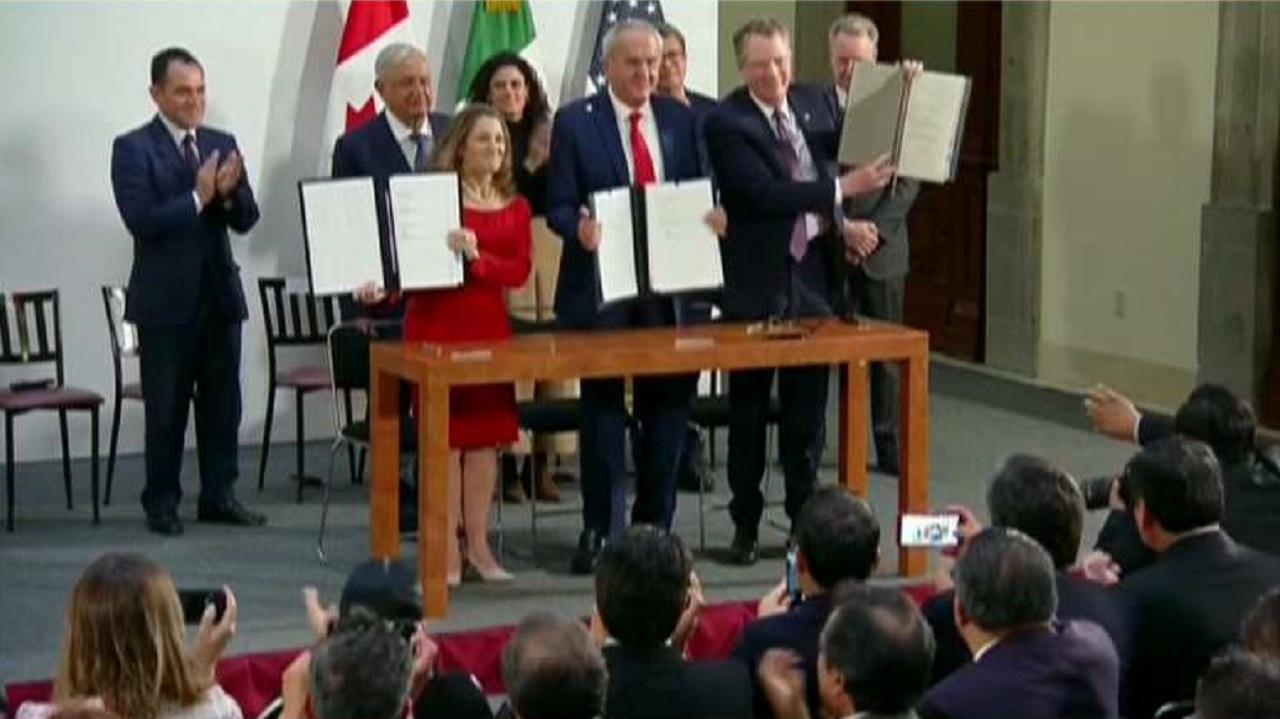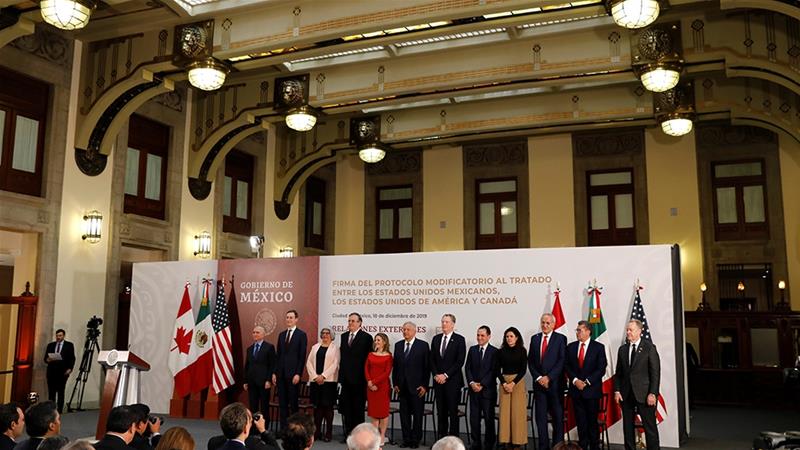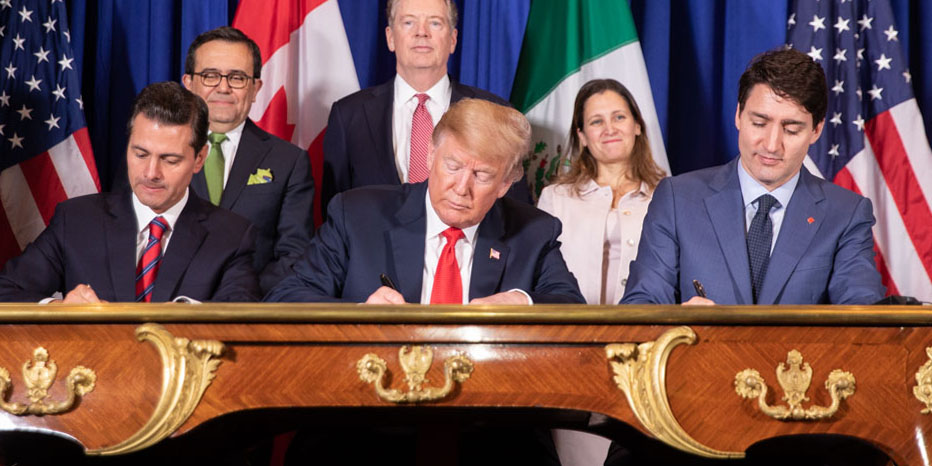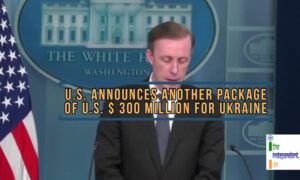
U.S. – Mexico – Canada Agreement’ (USMCA) signed
The United States (U.S.), Canada and Mexico have on Tuesday, i.e., December 10, 2019, finalised a trade deal, titled ‘U.S. – Mexico – Canada Agreement’ (USMCA) that will replace the 25-year-old North American Free Trade Agreement (NAFTA).
An official agreement was signed at the National Palace in Mexico by the representatives of the 3 nations. The signing-off ceremony was attended by the President of Mexico – Andres Manuel Lopez Obrador, the Deputy Prime Minister of Canada – Chrystia Freeland, U.S. Trade Representative – Robert Lighthizer and White House Adviser – Jared Kushner.

The agreement was signed hours after the Democrats, a leading political party in the U.S. Congress, said that they would support the agreement after White House agreed to further strengthen the labour laws and environment rules in the new agreement.
The agreement was first finalised more than a year ago on November 30, 2018. At that time, it was signed by the President of U.S – Donald Trump, President of Mexico – Enrique Peña Nieto and the Prime Minister of Canada – Justin Trudeau. However, it could not get through as it required approval by legislatures of the 3 nations.
Clearing the USMCA, the Speaker of the U.S. House of Representatives – Nancy Pelosi said, “There is no question, of course, that this trade agreement is much better than NAFTA, but it is infinitely better than what was initially proposed by the administration.”
USMCA has increased focus on labour laws and environmental issues. It also incentivizes more domestic production of cars and trucks and provides a capping on automotive production in Mexico and Canada. The agreement also provides updated Intellectual Property (IP) protections. It gives U.S. more access to Canada’s dairy market. Besides, the duty-free limit for Canadians who buy U.S. goods online has been increased from U.S. $ 20 to U.S. $ 150.
Terming the NAFTA as country’s worst deal, Trump tweeted, “America’s great USMCA Trade Bill is looking good. It will be the best and most important trade deal ever made by the USA. Good for everybody – Farmers, Manufacturers, Energy, Unions – tremendous support. Importantly, we will finally end our Country’s worst Trade Deal, NAFTA!”
America’s great USMCA Trade Bill is looking good. It will be the best and most important trade deal ever made by the USA. Good for everybody – Farmers, Manufacturers, Energy, Unions – tremendous support. Importantly, we will finally end our Country’s worst Trade Deal, NAFTA!
— Donald J. Trump (@realDonaldTrump) December 10, 2019
USMCA is a part of Trump’s presidential campaign of 2016. The talks were initiated to revive the NAFTA in 2017. For the records,
In April 2019, the U.S. International Trade Commission, a Federal Government agency, reported that initial version of the USMCA would create 176,000 jobs after 6 years and increase the GDP by 0.35%. However, the U.S. added, 266,000 new jobs in November 2019 alone.
As per the new deal, 75% of a vehicle’s parts are to be made in one of the 3 countries as compared to current requirement of 62.5% manufacturing from these 3 nations. The move will encourage free movement between these 3 countries, without inviting any tariff. It also makes it compulsory to get the parts made by workers who are earning atleast U.S. $ 16 an hour. It is seen to boost manufacturing in the U.S. as the wages higher as compared to Mexico.
According to a report by Trump Administration, the deal would create 76,000 auto jobs over 5 years. That would mean a more than 7% increase in employment over the current figure of 990,000 auto workers.

Speaking on the impact of the USMCA, the President of the American Automotive Policy Council – Matt Blunt said in a statement, “The USMCA allows the US auto industry to remain globally competitive by ensuring vehicles and auto parts are able to move freely across country lines.”
In the new agreement, the labour laws have also got a boost. Earlier, workers in the manufacturing industry have long blamed NAFTA for sending jobs to Mexico, where wages are low. A level-playing field has been created in the new agreement for the U.S. workers.
The agreement has a provision for an Inter – Agency Committee that will monitor Mexico’s labour reform implementation and compliance with labour obligations. It also provides a set of benchmarks for Mexico to meet in implementing the reforms.
Separately, there were no tariffs on most of the agricultural products traded between the 3 countries under NAFTA. Canada and Mexico are 2 of the biggest export markets for U.S. farmers and ranchers. While USMCA will also keep the tariffs at zero, it will further expand the scope of business for U.S. dairy and farm products in Canada. In return, the dairy and farm products of Canada will be permitted to enter U.S. without tariffs.
The USMCA also prohibits Canada and Mexico from forcing U.S. companies to store their data on in-country servers. It also has a clause which says that U.S. companies cannot be sued in Canada and Mexico for much of the content appearing on their platforms.







